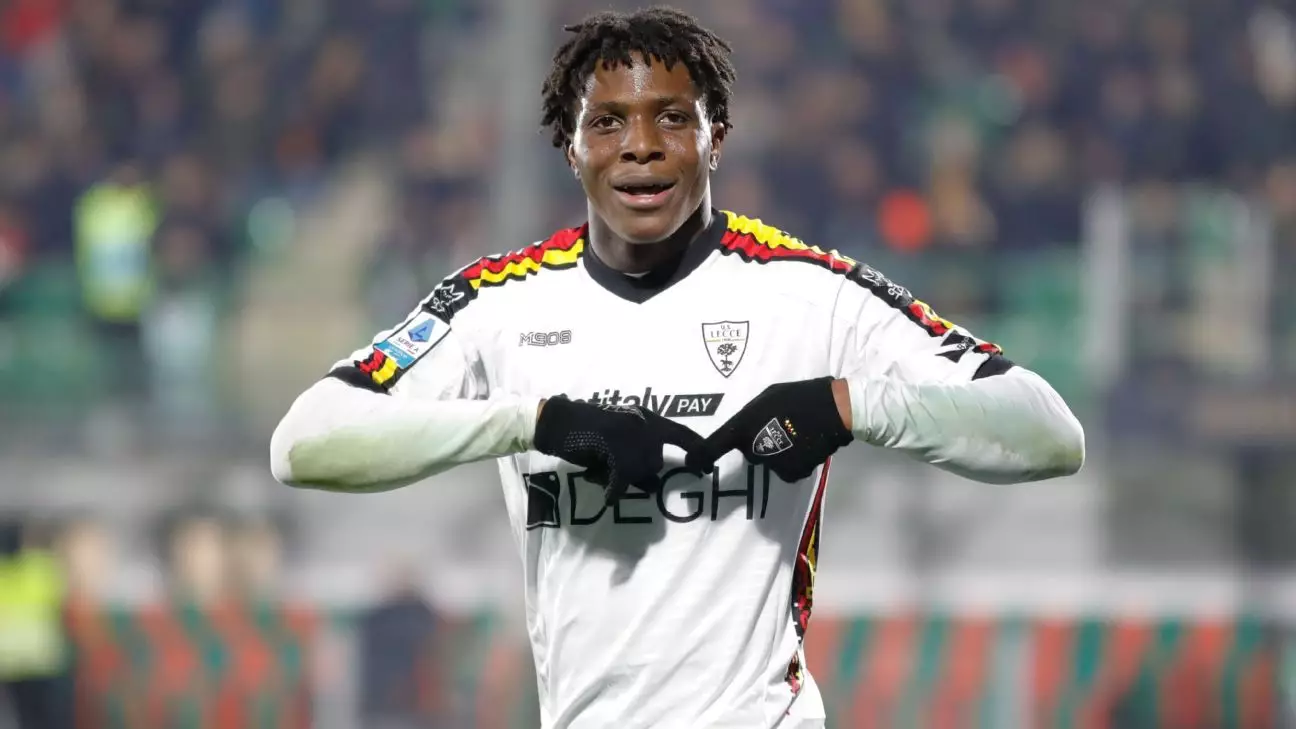As the transfer window approaches, excitement and speculation intensify around Premier League clubs, especially regarding their pursuit of promising young talents. Manchester United, a team in reconstruction, has entered the competitive fray to acquire Patrick Dorgu, a promising left-back from Lecce, who recently earned Denmark’s Young Player of the Year accolade. The competition for this 20-year-old prospect intensifies as Chelsea and Tottenham Hotspur also show interest, highlighting a significant trend in English football where clubs are on the lookout for youthful, dynamic players to bolster their squads.
Dorgu is projected to cost around £35 million, a figure that reflects not just his talent but also the escalating costs of acquiring young prospects in today’s market. United’s management, led by Ruben Amorim, appears determined to strengthen the left-back position, with Dorgu being one of several candidates under consideration, including well-known players such as Alphonso Davies and Milos Kerkez. This strategy indicates a broader philosophy among top clubs—prioritizing youth and skill over established names, setting a precedent in the way teams are built for future success.
Meanwhile, across the Atlantic, Brazilian wonderkid Vitor Reis is catching the attention of both Arsenal and Chelsea. Reis, only 18 years old and contracted to Palmeiras until 2028, has made his senior debut and has already begun to make waves as a player with exceptional potential. His remarkable performance has not gone unnoticed, and both London clubs are reportedly keeping a close eye on his progress in hopes of securing his services.
The fact that these two major English clubs are interested in a player from South America underscores the increasingly global nature of the Premier League transfer market. Historically, Brazilian players have had a profound impact in the league, and it seems that clubs are keen to tap into that talent pool early on. The lucrative nature of the Premier League also plays a significant role here; it allows clubs to invest in such promising players, often making it difficult for them to resist lucrative offers, no matter the length of their contracts.
In addition to focusing on young stars, Premier League clubs like Liverpool are also searching for long-term solutions to bolster their squads. Liverpool sees Joao Pedro of Brighton and Hove Albion as a potential successor to Darwin Núñez. Talks between the clubs suggest that Liverpool is serious about integrating this talented 23-year-old, who boasts an impressive goal record and has already represented Brazil on the international stage.
The strategy here reflects a broader recognition that securing a talented player early can significantly enhance a club’s competitive edge in the future. Given the ongoing rise in performance levels across Europe, it is imperative for clubs to scout and secure emerging talent before they become household names.
On the other hand, not all moves in the market are meant to add new talents. Chelsea’s reported decision to make Kiernan Dewsbury-Hall available for transfer just months after acquiring him demonstrates the fluid nature of the current market. Despite having joined from Leicester City not long ago, he hasn’t established himself as a crucial part of their plans. This situation reveals an important lesson: the rapidly changing dynamics of player performances and club needs can lead to unexpected player movements, often steering away from standard long-term planning.
In a slightly different vein, FC Utrecht’s interest in making Miguel Rodríguez’s loan from Celta Vigo permanent highlights the rising trend of clubs across Europe seeking to solidify their squads with players who have demonstrated their value. Rodríguez’s performance in the Eredivisie, coupled with Utrecht’s intention to trigger the clause in his loan agreement, emphasizes the importance of identifying and nurturing young talents at various levels of competition.
The summer transfer window is shaping up to be a pivotal moment for many Premier League clubs, with a clear shift towards investing in youth and promising talent. From Manchester United’s pursuit of Dorgu to Arsenal and Chelsea’s interest in Reis, the emphasis on younger players indicates an evolution in transfer strategies. The need for clubs to adapt to a changing market—whether through seeking out future stars or making strategic sales—demonstrates an understanding that success in football continues to hinge on smart business in addition to on-pitch performance. As the window approaches, fans and pundits alike will be watching closely to see how these narratives unfold.

